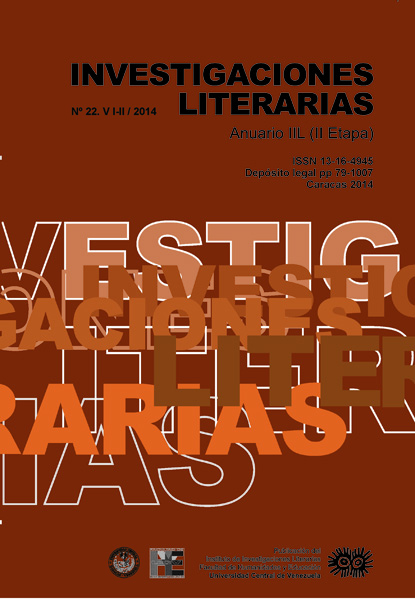POLÍTICA Y SOCIEDAD EN LA NARRATIVA VENEZOLANA ACTUAL. DOS CASOS ANTAGÓNICOS
Palabras clave:
literatura venezolana, Gisela Kozak Rovero, Carlos Noguera, narrativa del siglo XXI, Venezuelan literature, 21th century narrativeResumen
El presente artículo realiza, a través de un análisis comparativo, una indagación en el imaginario contemporáneo de Crónica de los fuegos celestes (2010) de Carlos Noguera y En rojo (2011), de Gisela Kozak Rovero, tomando en cuenta la representación que hacen de la sociedad venezolana y su entramado político. En este sentido, se pretende destacar la preponderancia de lo ideológico en la obra de Noguera como elemento constitutivo de ficción en contraposición con el texto de Kozak Rovero, donde predomina el empeño por configurar una visión total de la colectividad nacional. Sin embargo, en ambos casos, política y sociedad están estrechamente vinculadas, aunque en cada libro el énfasis no es el mismo. En Crónica de los fuegos celestes lo político tiene un protagonismo estelar, y lo que ocurre en esa materia es consecuencia de una condición moral determinada. En rojo, por el contrario, hace de lo social el tema mayor de su prosa para, en una dialéctica sutil, hacer de ella el producto de una situación política siempre influyente y asfixiante. El aporte, en definitiva, de este trabajo consiste en destacar aquellos acontecimientos nacionales que prevalecen en el imaginario urbano de la narrativa venezolana actual, así como las estrategias empleadas por sus autores para plasmarla.
ABSTRACT
Through a comparative analysis, this paper explores the contemporary imagination of Crónica de los fuegos celestes (2010) of Carlos Noguera y En rojo (2011) of Gisela Kozak Rovero, given its representation of Venezuelan society and the political fabric. In this sense, it is intended to highlight the preponderance of ideology in the work of Noguera as a constituent element to fiction, in contrast to the text of Kozak Rovero, where the predominant effort is setting an overall vision of the national community. However, in both cases, politics and society are closely linked, although the emphasis is not the same in both books. Politics has a starring role in Crónica de los fuegos celestes, and what happens in that sphere is the result of a certain moral condition. On the contrary, En rojo transforms the social issues in the main theme of its prose, which by a subtle dialectic turns into the product of an always influential and suffocating political situation. In short, the contribution of this paper is to highlight those national events prevailing in the urban imagery of the current Venezuelan narrative and the strategies used by the authors to capture them.

